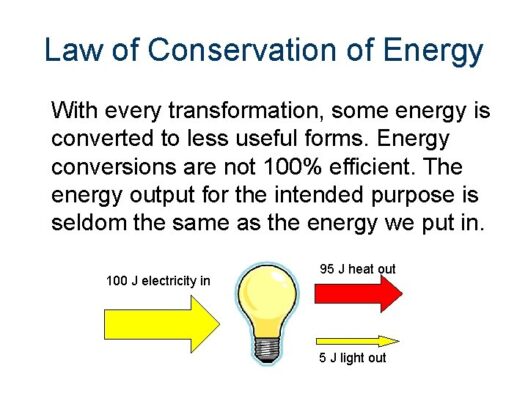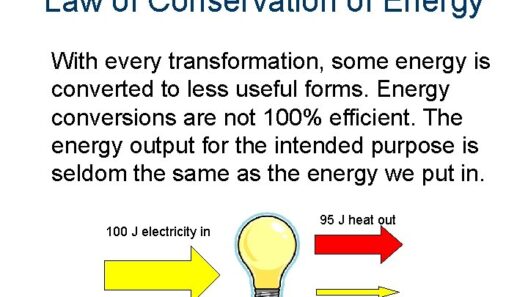Time travel has captivated the human imagination for centuries, igniting a fervent curiosity about the possibilities beyond our linear understanding of temporal progression. Within the realm of physics, however, the concept of time travel invokes profound debates, particularly concerning the conservation of energy. The conservation law, which asserts that energy cannot be created or destroyed, stands as a fundamental principle in both classical and modern physics. Yet, when one introduces the notion of traversing the temporal continuum, questions arise regarding the potential breach of this quintessential law.
The laws governing energy conservation operate under the premise that the total energy in an isolated system remains constant. This means that energy can transition from one form to another, whether it be kinetic energy morphing into potential energy, or thermal energy dispersing in a system; yet the aggregate energy must remain invariant. To hypothesize time travel necessitates an exploration of hypothetical frameworks, particularly those proposed in the field of theoretical physics, such as general relativity and quantum mechanics.
General relativity, formulated by Albert Einstein, posits that time is not a fixed entity but rather a dimension intertwined with the fabric of space. This perspective allows for the conceptualization of warped spacetime, wherein massive objects such as planets and stars curve the temporal landscape. Theoretically, if one could manipulate these warps, either through massive gravitational forces or hypothetical constructs like wormholes, the door to time travel may creak ajar. However, the crux of the debate hinges on whether such manipulations could engender scenarios where energy is no longer conserved.
Wormholes, sometimes dubbed Einstein-Rosen bridges, represent tantalizing potential gateways through time and space. They allow for shortcuts across the universe, raising questions about their applicability to time travel. If a wormhole were traversed, would a traveler emerge in a different time frame with energy imbalances? The implications are staggering. One could imagine a future traveler returning to the past and altering pivotal historical events, potentially leading to a scenario where energy is suddenly transferred or dissipated, thus remaining outside the conservation law’s parameters.
A common theoretical framework for discussing time travel involves the concept of closed time-like curves (CTCs). Such phenomena imply that one could loop back on oneself through time, encountering past versions of oneself and potentially interacting with them. Herein lies a fascinating paradox: if one were to retrieve energy from the past—say, by acquiring a certain amount of energy in a previous era—would that not infringe upon the law of conservation? By lifting this energy out of its temporal context and bringing it to the present, the continuity of energy flow comes into question.
Moreover, quantum mechanics introduces yet another layer of complexity. The probabilistic nature of subatomic particles facilitates a peculiar realm where particles can exist in superposition and exhibit behaviors defying classical intuition. Some realities within quantum mechanics suggest that every action yields multiple potential outcomes; thus, if one were to venture into the past and change a singular event, one might inadvertently create divergent timelines. These alternate realities could siphon energy from the original timeline, leading to net losses or gains, thereby encroaching on the conservation law.
Yet, proponents of time travel argue that the perceived energy discrepancies may not equate to actual violations of conservation. They posit that if time travel, as conceptualized, were indeed feasible, a larger cosmic framework might govern the energies involved—one that incorporates yet transcends our conventional understanding. Perhaps the universe possesses an intrinsic mechanism for balancing energy exchanges across timelines, ensuring that while individual events may be altered, the overall energy remains conserved on a universal scale.
This notion prompts a shift in perspective, encouraging thinkers to explore not just the mechanistic ramifications of time travel, but its philosophical implications. Encounters with alternate selves or the manipulation of pivotal historical events offer tantalizing glimpses into themes of causality and responsibility. If time travel does hold the power to facilitate energy fluctuations, what ethical responsibilities would a time traveler bear? What moral compass must guide those who hold dominion over time and, by extension, energy?
Addressing the Feasibility of Time Travel
When contemplating the practicality of time travel, it’s imperative to acknowledge the extensive energy requirements posited by some theories. For instance, physicist Kip Thorne speculated that creating a traversable wormhole might necessitate ‘negative’ energy—a concept still steeped in mystery. The prospect of generating such energy raises yet more questions about its alignment with conservation laws. Would the pursuit of time travel inevitably lead us down a path of energy exploitation, or does it reveal more about our current understanding of energy and its conservation?
The pursuit of technological advancements often necessitates balancing ambition with caution. Climate change stands as a pressing global challenge, demanding innovative solutions. Does the quest for time travel distract from the urgent energy reforms necessary for sustainable futures? As society grapples with the realities of a warming planet, should we devote efforts to navigate the temporal fabric of existence? Or should we cultivate our energies and resources here and now, ensuring they are used judiciously for future generations?
Ultimately, the inquiry into whether time travel violates the law of energy conservation leads us down intricate pathways of science, philosophy, and ethics. The gradual unraveling of these profound questions compels us to embrace curiosity while remaining grounded in our responsibilities. As we venture further into the realms of theoretical exploration, mindful of our energy consumption in the present may yield more profound implications than the enigmas of yesterday or tomorrow.








